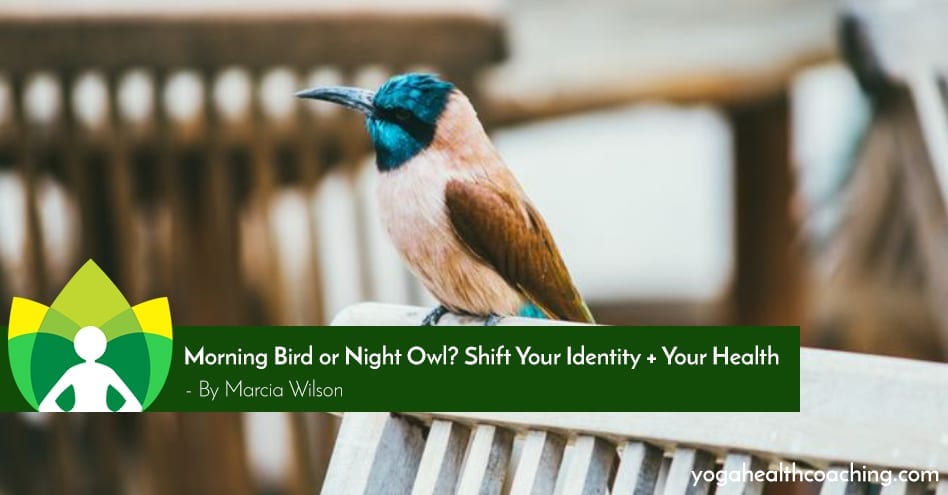
Morning Bird or Night Owl? Shift Your Identity + Your Health
A friend of mine is a morning show radio host. For years she tried to sell me on her secret to making more time in her day- a 3:30am wake-up call. By 8am she had already recorded her show, gone for a run and ferried her kids off to school. Me? I was a night owl who rocked the late night jams that pushed my projects to the finish line. Who doesn’t love going to bed with a big check mark beside that one thing that you’ve been wanting to finish up?
But in my 40’s something wasn’t working anymore. I was struggling with mental focus, flare- ups of inflammatory conditions and general crabbiness. Thinking I was “hangry” I would snack frequently and I piled on weight. What I was missing was this realization: I was a tired night owl who couldn’t hack it any more. The consequences of using my night energy to get things done was burning me out. My night owl tendencies were backfiring and costing me my health.
Nature or Nurture? And at what cost?
Is being a night owl a given based on your genetic makeup? Or is it a learned behaviour that we can change?  Recent research identifies specific genetic changes that make some people radical night owls who don’t go to sleep until 2am or later. Other studies show that our circadian rhythms are determined by genetic variants that impact our wake-up time, and that we can shift them with light therapy. It would seem that our current tendencies are indeed a combination of nature AND nurture.
Recent research identifies specific genetic changes that make some people radical night owls who don’t go to sleep until 2am or later. Other studies show that our circadian rhythms are determined by genetic variants that impact our wake-up time, and that we can shift them with light therapy. It would seem that our current tendencies are indeed a combination of nature AND nurture.
The incentive to be a night owl is high for some people. Creativity, intelligence and stamina are said to be higher for those who work into the wee hours. For those of us who tend towards night owl life, the late evening “second-wind” can be a boon to productivity.
At what price though? Night owls seems to be at higher risk for health issues. Depression, sleep apnea, poor eating habits, and greater risk for diabetes are commonly listed as night owl health risks.
We Need Sleep
Sleep is the lost art of self care in our electricity-fueled world. We ignore the rhythms of the day and use the convenience of wifi and light to deny our natural evening desire to slow down and sleep. When we start to feel tired we label it as “bad”and we fight it. Rather than succumbing to our fatigue we feed our overworked nervous systems with sugar, coffee, blue light and a 24 hour stream of social media. Our identities as night owls are firmly reflected in our fight to stay awake long enough to catch the second wind that arises for many of us at 10pm. By pushing away sleep we sustain the benefits of our night owl persona- at a cost.
Identify Shift
My shift to becoming an early bird began when I decided I did not want to be tired, ill and irritable any more.  I started studying and practicing Dinacharya- the health-promoting daily routine recommended by Ayurveda. One of my biggest learnings was the critical need to use habit science to create behaviour changes that stick. Knowing what habits to implement and wanting to change were not enough to create a shift in behaviour for me. I needed to learn how to trigger specific habits that would help me become a morning person. But first I had to play with the idea of identity shift: I had to get clear on WHO I wanted to become and what kind of habits that person has.
I started studying and practicing Dinacharya- the health-promoting daily routine recommended by Ayurveda. One of my biggest learnings was the critical need to use habit science to create behaviour changes that stick. Knowing what habits to implement and wanting to change were not enough to create a shift in behaviour for me. I needed to learn how to trigger specific habits that would help me become a morning person. But first I had to play with the idea of identity shift: I had to get clear on WHO I wanted to become and what kind of habits that person has.
I wanted to become bright eyed, healthy, clear thinking and focused. I wanted more time for me and for my work and family. I wanted to have a clear sense of how I would show up each day.
This was my new identity. And it meant I needed to become an early bird.
The Habits of Early Birds
If you start asking early birds what they do consistently each day- what makes them an early bird- there is one common thread: they go to bed early. The success of their day begins the night before when they fall asleep- often by 8:30pm For those of us who have learned to love the productivity, focus and quiet of our early morning wakeups, this requires a concerted effort to avoid our inclination to work after dinner. We need to learn to replace one set of habits- night owl late night work- with another.
My New Evening Routine
I have learned that my new morning bird identity is less about what I need to do to get myself out of bed in the morning and more about how I ensure I am asleep long before the Ayurvedic clock switches over into second wind time at 10pm. Evening has become a time for using all my senses to calm myself, fall into the natural heaviness of the day, and go to sleep content.
Here are my 3 favorite evening bedtime tricks. These habits keep me true to my new morning bird identity.
1. Electronics Free Room
One of my challenges has always been my strong desire to connect even at bedtime. Buying a digital alarm clock is one of the simplest and most effective tools I have discovered to help me stay focussed on “me” rather than the outside world. My charging station is now outside my bedroom- by leaving my phone outside my sleeping quarters I have created a space that is quiet and reflective. This gives me mental space to use my Best Self Journal to do my daily reflections and gratitude practice. I end the day in a reflective and grateful space.
2. Mind Dump by 6pm
Using David Allen’s Getting Things Done “Mind Dump” technique by 6pm each night means that I am not carrying my day into my evening routine. I consistently make sure that I capture ideas, to-do’s, and anything else that is hanging out in my mind space BEFORE I leave my office- even though my office is in my home. I don’t process or start to convert my mind dump into a project or to do- I simply make sure that it is out of my mind and documented so that when I come back to my next planning time block it is there, waiting for me to determine my next action.
3. Take Care of Me
The best part of my evening has become another shift in identity- learning to do something nice just for me. Walking my dog and settling into the rhythm of my breath. A warm shower after an oil massage. Reading something inspirational. Listening to quiet music. Oiling my feet. And using my diffuser with lavender and vetiver to help me feel the heaviness of the day and settle, calm and relax. Receiving self care helps me close off my day and makes my morning wake up easeful.
Making the Choice to Shift
For most of us, our tendency towards night owl or morning bird life is a combination of genetic tendencies and learned habits. For me, making the connection between my night owl persona and my health issues was an eye opener. It made the choice to shift an obvious one- and has paid dividends. I love my mornings. An unexpected boon to shifting my identity.



